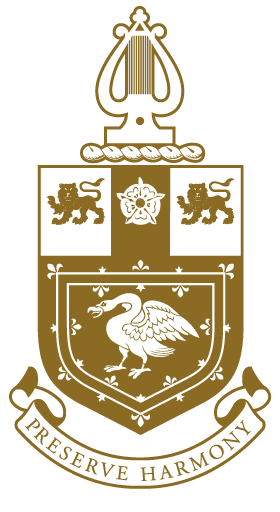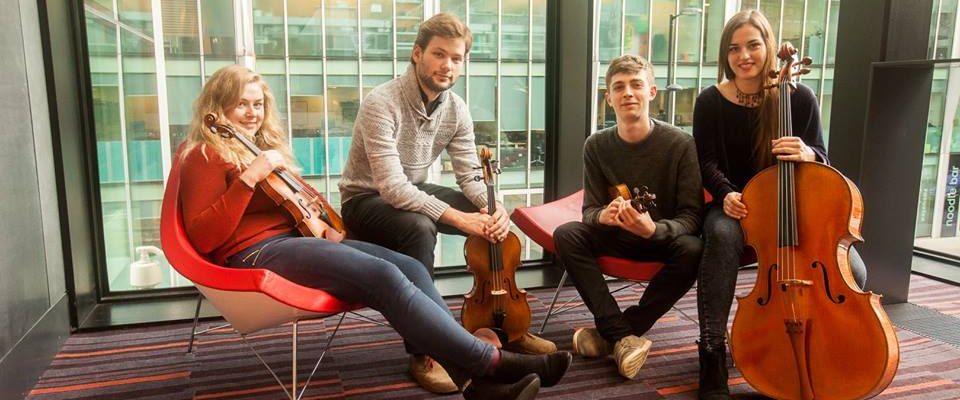Young Artist Interview: Amarins Wierdsma
Amarins Wierdsma is an award-winning Dutch and American violinist studying for an Artist Diploma at the Guildhall School of Music and Drama with David Takeno. An internationally active soloist and chamber musician, Amarins is also co-founder of the Barbican String Quartet, Park Lane Group Young Artists which regularly performs at festivals and venues including Barbican Hall and St James’s Piccadilly. In 2017, the quartet will make its Wigmore Hall debut thanks to a Maisie Lewis Foundation Award.
1 When and where did you first pick up the violin?
When I was two years old, my parents took me to a performance at our local music school in our town in the Netherlands. They had a friend whose son was performing (I believe he was four or five at the time). When we got home I apparently said, ‘mommy, I want to play the violin’. Of course my parents thought I was too young but after begging them for half a year and imitating violin playing in the sandbox with shovels, they decided to find me a teacher. Luckily there was a teacher willing to teach me who didn’t live too far away! She taught me by using the Suzuki method, which teaches kids by ear, without teaching them to read notes in the beginning, which was very good for me at that age!
2 You perform as both a chamber musician and soloist. Which makes you happiest?
In a way I don’t really see that much of a difference between soloing with orchestras and playing with my quartet or in other combinations. A violin concerto should be a similar conversation between the violin and the orchestra as between the different instruments in a chamber group. I enjoy both equally though but for different reasons. I love the freedom I have when playing a concerto. I also really enjoy the magnitude of an orchestra on stage.
Quartet playing I find particularly satisfying because we work together regularly and trust each other’s opinions. I like the idea of having three colleagues who I trust completely. During rehearsals we discuss the pieces we are rehearsing in great detail. It’s also always good to have musicians around who aren’t afraid to criticise. We can be very hard on each other but always with the best of intentions. In the end we all want the same thing, for the music to speak in every note and for the audience to understand exactly what the composer is trying to bring across to the audience. I also find it very interesting because we all have different backgrounds and always bring different opinions and influences to the rehearsals
3 What violin do you play?
It’s a Landolfi violin from 1755. I’ve had it on loan from the National Music Instruments Foundation (NMF) for a couple years. I’m extremely grateful to them!
4 Who are your violin heroes?
That’s always a difficult question. As a kid I always looked up to the Dutch violinist Janine Jansen, who studied with the same teacher as I did, Coosje Wijzenbeek. I grew up going to her concerts and being amazed. Of course I still love her playing but the are many musicians I respect and who inspire me. Lately I’ve enjoyed working with pianist and great teacher Ferenc Rados at IMS Prussia Cove with my quartet. He is such a deep musician and I look up to him because of his understanding of music but also because he is still searching every day to find more meaning in every piece he plays. Also, I would have to mention the wonderful violinist Ginette Neveu, who died far too early but whose recordings are very inspiring.
5 How does music study in the Netherlands compare to the UK?
I would say it’s quite similar. I moved to the UK to study with my teacher, David Takeno, who I am very happy to study with. I’m also enjoying getting to know the music world in London. Having grown up in a musical family in the Netherlands, I knew the music world there from a very young age. I was very happy studying in Amsterdam but needed something more challenging, a new chapter in my life, and have found that in London.
6 Which award has had the greatest impact on your career?
Also a difficult question. I guess different awards have different impacts at different times. For instance, I’ve received a couple of scholarships to enable me to study in the UK. I’m extremely grateful to these awards because they helped me move forward in my life. Sometimes awards that you don’t receive also make a big impact on you. It hurts but then sometimes you work harder afterwards to make sure you do better next time!
7 Your stage persona has been described as ‘large’. How do you prepare for performances?
I’m not sure if I really prepare for performances. I’ve been performing since I was about five or six years old and usually feel quite comfortable on stage. I like the feeling of a performance. I would say I prepare by trying to get to know the music as best I can and then usually try to have a little tryout of some sort before the real performance to know how it might feel on stage. Often a piece can change quite a bit after a couple of performances, and make more (or less!) sense than it did in the practice room, and it’s good to be aware of that.
8 What person has had the most influence on your music?
My main teachers, Coosje Wijzenbeek, Vera Beths (and her cellist husband, Anner Bylsma) and my current teacher David Takeno as well as the many other great musicians I’ve had the pleasure of working with. My parents have also been a great influence. My mother is a clarinetist and my father was a conductor, but he passed away a couple years ago.
9 What’s the best thing to happen to you recently?
Travel! Seeing the world, meeting people and seeing beautiful places.
10 What do you have planned for 2017?
Music! Plenty of practice and hopefully fun times and nice concerts with friends.





